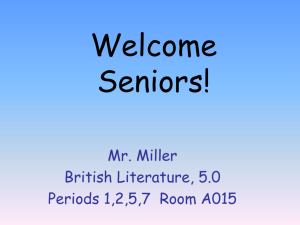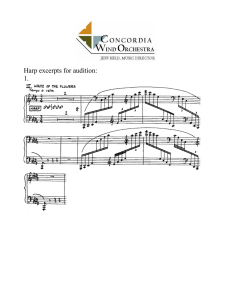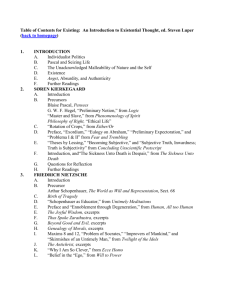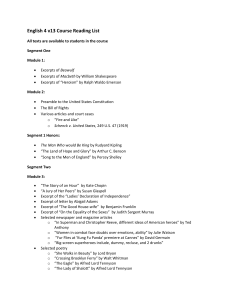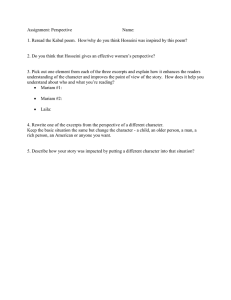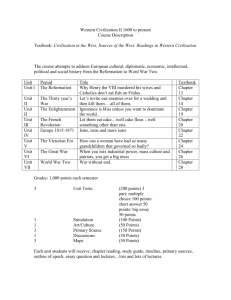Anthropology 21A.110 Spring 2003
advertisement
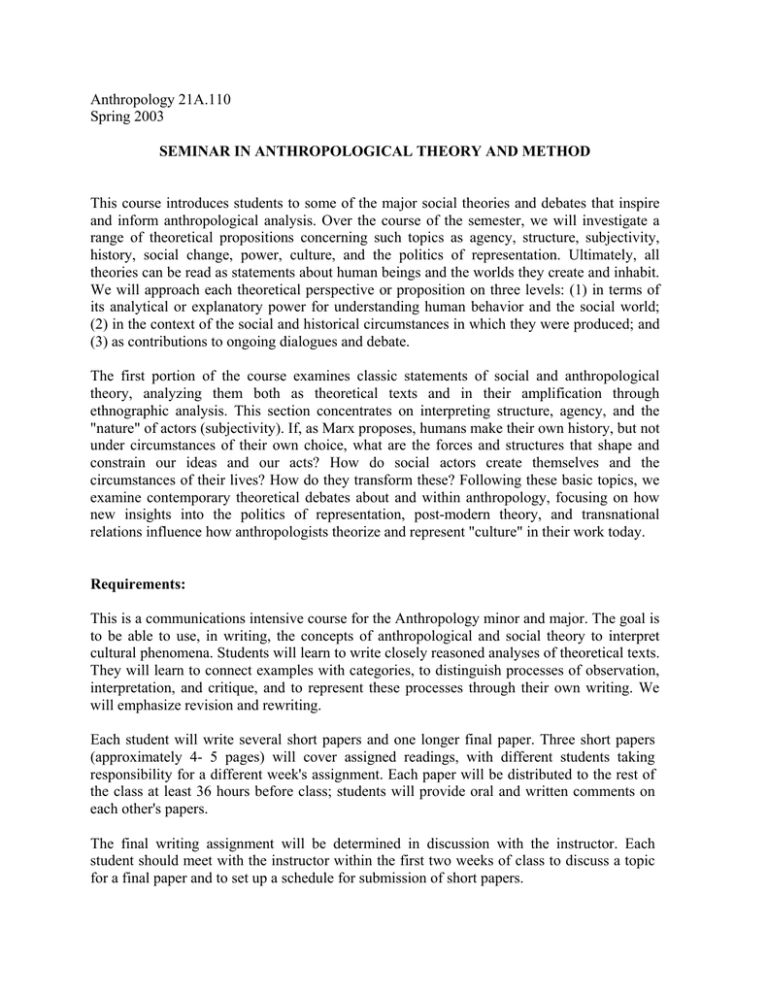
Anthropology 21A.110 Spring 2003 SEMINAR IN ANTHROPOLOGICAL THEORY AND METHOD This course introduces students to some of the major social theories and debates that inspire and inform anthropological analysis. Over the course of the semester, we will investigate a range of theoretical propositions concerning such topics as agency, structure, subjectivity, history, social change, power, culture, and the politics of representation. Ultimately, all theories can be read as statements about human beings and the worlds they create and inhabit. We will approach each theoretical perspective or proposition on three levels: (1) in terms of its analytical or explanatory power for understanding human behavior and the social world; (2) in the context of the social and historical circumstances in which they were produced; and (3) as contributions to ongoing dialogues and debate. The first portion of the course examines classic statements of social and anthropological theory, analyzing them both as theoretical texts and in their amplification through ethnographic analysis. This section concentrates on interpreting structure, agency, and the "nature" of actors (subjectivity). If, as Marx proposes, humans make their own history, but not under circumstances of their own choice, what are the forces and structures that shape and constrain our ideas and our acts? How do social actors create themselves and the circumstances of their lives? How do they transform these? Following these basic topics, we examine contemporary theoretical debates about and within anthropology, focusing on how new insights into the politics of representation, post-modern theory, and transnational relations influence how anthropologists theorize and represent "culture" in their work today. Requirements: This is a communications intensive course for the Anthropology minor and major. The goal is to be able to use, in writing, the concepts of anthropological and social theory to interpret cultural phenomena. Students will learn to write closely reasoned analyses of theoretical texts. They will learn to connect examples with categories, to distinguish processes of observation, interpretation, and critique, and to represent these processes through their own writing. We will emphasize revision and rewriting. Each student will write several short papers and one longer final paper. Three short papers (approximately 4- 5 pages) will cover assigned readings, with different students taking responsibility for a different week's assignment. Each paper will be distributed to the rest of the class at least 36 hours before class; students will provide oral and written comments on each other's papers. The final writing assignment will be determined in discussion with the instructor. Each student should meet with the instructor within the first two weeks of class to discuss a topic for a final paper and to set up a schedule for submission of short papers. Reading materials: There have been no books specifically ordered for this seminar, although you may wish to purchase some which are generally available in area bookstores. Additional readings may be assigned as we develop paper topics. This is a provisional list of readings from which we can adapt, add or subtract, as we go along. I have attached a set of helpful hints about how generally to work through long lists of readings. Specifically, for this course on theory, I suggest that you approach each reading with the following questions in mind: i) Putting the work in the tradition of social theory. Try to get the big picture. -- What is the phenomenon being explained? -- What is the explanation offered? -- How does this apply to a specific observable phenomenon in social relations, in other words, what examples can you generate to illustrate the explanation offered? -- With whom (or what alternative point of view) might the author be arguing? Or, how does this explanation differ from other explanations for the same phenomenon? ii) Close textual reading. -- Find some portions of the text you want us to discuss for close reading and interpretation. -- Find portions that are difficult or unclear to you. -- Find portions that you think exemplify the author's most important insights. Grading: The final grade will be based on completion of assignments ( 35% ), quality of assignments (20% ), improvement over the semester ( 25% ), attendance and class discussion ( 20% ). 2 Provisional SCHEDULE AND READING ASSIGNMENTS Week 1 What is theory? Debating the Case of Captain Cook Sahlins, Marshall. "Captain James Cook; or, The Dying God" in Islands of History (pp. 104-135). Obeyesekerre, Gananath. The Apotheosis of Captain Cook, chap. I, III, IV (pp. 3-22; 49-73; 102-119). I. COLLECTIVITY AND STRUCTURE Week 2 Emile Durkheim and the Collective Conscience Durkheim, The Division of Labor, excerpts Rules of Sociological Method, excerpts. Suicide, excerpts. Week 3 Marx, History, and Materialism: Political Economy Marx, selections on historical materialism and alienated labor Selections from Marx Engels Reader (Tucker, editor). Society and Economy in History (pp.136-142). Theses on Feuerbach (pp.143-145). The German Ideology, Part I. ( up to "The Real Basis of Ideology", (pp. 146- 176). The Communist Manifesto. Lipsitz, George, Time Passages, excerpts. William Chambliss, "Vagrancy Law in England and America." Douglas Hay, "Property, Authority, and the Criminal Law." E.P. Thompson, "The Rule of Law." Sidney Mintz, Sweetness and Power, excerpts. Griswold, Wendy, " The Ideas of the Ruling Class" Week 4 Marx, History and Commodity Fetishism Selections from Capital, Volume 1, especially 1.1. "The two factors of the commodity" 1.2. "The dual character of labor embodied in commodities" 1.4. "The fetishism of the commodity and its secret" 2. "The process of exchange" 4. "The general formula for capital" 26. "The secret of primitive accumulation" 3 II. SUBJECTIVITY AND STRUCTURE Week 5 Weber, Rationalization and Modernity Weber, Max. The Protestant Ethic and the Spirit of Capitalism. "The fundamental concepts of sociology, " from The Theory of Social and Economic Organization. "The Ideal Type" "The Protestant Sects and the Spirit of Capitalism." Excerpts on rationalization. Ritzer, Macdonalization of the World. Week 6 Structuralism in Anthropology Levi-Strauss, Claude. The Elementary Structures of Kinship, excerpts. Week 7 The Foucauldian Subject of Power and Discourse Foucault, Michel. The History of Sexuality. Volume 1. excerpts. Discipline and Punish, excerpts. "Two Lectures" "Truth and Power" Week 8 Categorization Durkheim and Mauss, Primitive Classification, excerpts. Douglas, Mary. Purity and Danger, excerpts Douglas and Wildavksy, Risk and Danger, excerpts Week 9 Negotiating Agency and Structure in Practice Bourdieu, Pierre. "The social space and the genesis of groups" "Time Perspectives of the Kabyle" An Invitation to Reflexive Sociology, excerpts. Laberge, Suzanne and Joanne Kay, "Pierre Bourdieu's Sociocultural Theory and Sport Practice." Week 10 Face to Face Interaction Goffman, Erving. Excerpts from Presentation of Self in Everyday Life, Encounters, "Fun in Games.' 4 III. POST-STRUCTURAL CRITIQUE Week 11 Representation in Anthropology Clifford, James. The Predicament of Culture, excerpts. Clifford, James and George Marcus. Writing Culture, excerpts. Marcus, George and Michael Fischer. Anthrhopology as Cultural Critique, excerpts. Ortner, Sherry, "Theory in Anthropology Since the Sixties." Collier, Jane and Yangasako. "Theory in Anthropology since Feminist Practice." Rosaldo. "Subjectivity in Social Analysis" Smith, Dorothy. "No One Commits Suicide." Week 12 Globalization and Modernity Appadurai, Arjun. "Disjuncture and Difference in the Global Cultural Economy." Silbey, Susan S. "Let Them Eat Cake: Globalization, Post-modern colonialism and the Possibilities of Justice." Giddens, Anthony. The Consequences of Modernity. Week 13 Conclusions 5 Guide to Reading Social Science: How to work through long reading assignments Faced with a long list of readings in any social science field, you need to learn to read extensively as well as intensively; it is rarely practical to read everything word for word and line for line. Although close textual reading and interpretation is part of social science tradition, it is often not possible, especially for introductory and intermediate level survey courses. Instead of trying to read every line and word, consider the following suggestions for more efficient and effective course reading. I. Organize Reading Over the Weeks and Months. Look over the material to be covered (syllabus and tables of contents in assigned books). Estimate the amount of reading for the semester and try to divide the work on a weekly basis. Some weeks may have more reading assigned while other weeks less. Although the assignments vary, try to keep your work and pace steady. It will become less burdensome and easier to manage. Make sure to build into your schedule time for written assignments (including first, second and third drafts with time in between for other people’s comments, rethinking and revision). II. Begin Any Reading Assignment by Reading the Abstract, Preface, Introductions, and Conclusions. These are often the most important parts of any text because the author often signals his or her major themes and arguments. It is necessary, however, to look over, sometimes very carefully and completely, the central portions of the text to identify the evidence provided for the major themes/ theses. Often, the topic (first) sentences of paragraphs provide the links in the author’s argument. Inspectional reading (of a book or article): a. Look at the title page and the preface b. Study the table of contents to obtain a general sense of a book’s structure c. Check the index d. Read the publisher’s blurb e. Skim the summary statements in the opening and closing paragraphs of pivotal chapters f. Formulate what you think you know about this issue. What do you consider the essential points and key explanatory factors? You may know nothing about the topic; use this ignorance to devise a list of what you need the author to tell you in order to become informed. III. Mechanics of Reading and Note Taking. Read the text and make marginal notes (on post-its or separate piece of paper) indicating what seemed like the strongest parts of the text. When you have completed a once through the text, go back and take notes in outline form, by paraphrasing sentences or paragraphs until you have reduced the many pages of text to a few pages. (Make sure to keep an accurate citation to the work so that any future use of these notes and paraphrases can be appropriately cited. You do not want to find yourself engaged in plagiarism.) Do not rely on underlining. Do no rely on highlighting. This is insufficient. 6 In order to “know” a text, you need to convert it into your own words, or your own organization of the text. The text needs to be processed several different ways in your brain. Underlining is passive and does not help you learn the material. Analytical reading: a. Classify the book or article according to kind and subject matter. Into what paradigm or research program (genre) does that work fit? What is the book about as a whole? b. Enumerate the major parts in their order and relations, outline these as you have outlined the whole. c. Define the specific problem or problems the author has tried to solve. What question does the author claim to address? You might also want to think about how this reading fits into the course. Why did the instructor place the reading at this point in the course? What is the topic on the syllabus? How does this reading provide an answer or information for this topic? d. What theoretical statements does the author make? A theoretical statement proposes a relationship. For example, structural theories of deviance suggest that deviance (that which is to be explained) is a consequence of the structure (organization of the parts) of a society. In other words, social structure produces deviance. e. What are the concepts and variables used? Become familiar with the author by defining key words. Know the details of the argument. In the example above: what is social structure? What is meant by deviance? Do structural theorists/ writers assume the reader knows what is meant by social structure? Do you need to find out what this means in order to understand the reading. f. How does the author’s argument/ position compare with that of others who address the same question or related questions? Where are the points of similarity and difference? g. What normative statements (value judgments) does the author make? What values does the author assume readers will share? What assumptions do the author make that may be contestable? h. What is the author’s methodology? (Here you should be concerned not only with the methods used but the kinds of arguments implied or given about what methods are more or less appropriate.) What constitutes evidence in this reading? Know the author’s arguments by finding them in, or constructing them out of, sequences of sentences. 7 i. Determine which of the problems the author has solved and which she has not; and of those not solved, decide which the author knows he has failed to solve. If you disagree with the author, on what basis do you rest your disagreement? Is the author uninformed, misinformed, illogical, imprecise, or incomplete? Criticize fairly; do not pass judgment based on personal opinion, taste, or preference. Is the argument internally consistent? Does the evidence (both that presented by the author and other evidence in the field) support the argument? IV. Abstract Full Bibliographic citation. Thesis: 1-2 sentences. Details: 3-4 well constructed paragraphs. Themes: 3-4 bullet points defining and using authors key concepts. V. I recommend students consult and use Lee Cuba, A Short Guide to Writing About Social Science, second edition (New York: Harper Collins, 1992) for additional instruction in reading and writing social science, abstracting and summarizing readings. You will find this book helpful for other subjects as well. 8
